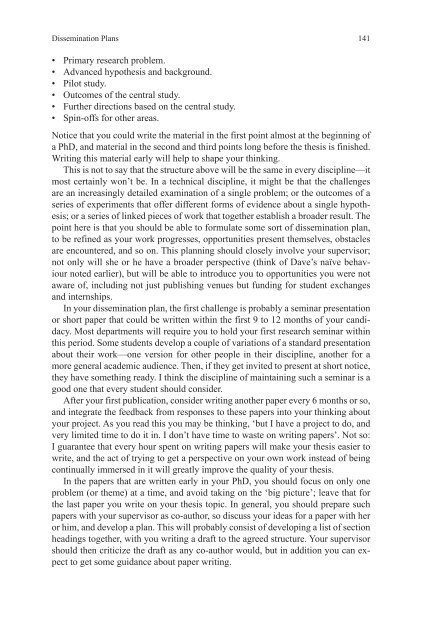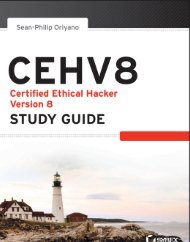How-to-Write-a-Better-Thesis
You also want an ePaper? Increase the reach of your titles
YUMPU automatically turns print PDFs into web optimized ePapers that Google loves.
Dissemination Plans <br />
141<br />
• Primary research problem.<br />
• Advanced hypothesis and background.<br />
• Pilot study.<br />
• Outcomes of the central study.<br />
• Further directions based on the central study.<br />
• Spin-offs for other areas.<br />
Notice that you could write the material in the first point almost at the beginning of<br />
a PhD, and material in the second and third points long before the thesis is finished.<br />
Writing this material early will help <strong>to</strong> shape your thinking.<br />
This is not <strong>to</strong> say that the structure above will be the same in every discipline—it<br />
most certainly won’t be. In a technical discipline, it might be that the challenges<br />
are an increasingly detailed examination of a single problem; or the outcomes of a<br />
series of experiments that offer different forms of evidence about a single hypothesis;<br />
or a series of linked pieces of work that <strong>to</strong>gether establish a broader result. The<br />
point here is that you should be able <strong>to</strong> formulate some sort of dissemination plan,<br />
<strong>to</strong> be refined as your work progresses, opportunities present themselves, obstacles<br />
are encountered, and so on. This planning should closely involve your supervisor;<br />
not only will she or he have a broader perspective (think of Dave’s naïve behaviour<br />
noted earlier), but will be able <strong>to</strong> introduce you <strong>to</strong> opportunities you were not<br />
aware of, including not just publishing venues but funding for student exchanges<br />
and internships.<br />
In your dissemination plan, the first challenge is probably a seminar presentation<br />
or short paper that could be written within the first 9 <strong>to</strong> 12 months of your candidacy.<br />
Most departments will require you <strong>to</strong> hold your first research seminar within<br />
this period. Some students develop a couple of variations of a standard presentation<br />
about their work—one version for other people in their discipline, another for a<br />
more general academic audience. Then, if they get invited <strong>to</strong> present at short notice,<br />
they have something ready. I think the discipline of maintaining such a seminar is a<br />
good one that every student should consider.<br />
After your first publication, consider writing another paper every 6 months or so,<br />
and integrate the feedback from responses <strong>to</strong> these papers in<strong>to</strong> your thinking about<br />
your project. As you read this you may be thinking, ‘but I have a project <strong>to</strong> do, and<br />
very limited time <strong>to</strong> do it in. I don’t have time <strong>to</strong> waste on writing papers’. Not so:<br />
I guarantee that every hour spent on writing papers will make your thesis easier <strong>to</strong><br />
write, and the act of trying <strong>to</strong> get a perspective on your own work instead of being<br />
continually immersed in it will greatly improve the quality of your thesis.<br />
In the papers that are written early in your PhD, you should focus on only one<br />
problem (or theme) at a time, and avoid taking on the ‘big picture’; leave that for<br />
the last paper you write on your thesis <strong>to</strong>pic. In general, you should prepare such<br />
papers with your supervisor as co-author, so discuss your ideas for a paper with her<br />
or him, and develop a plan. This will probably consist of developing a list of section<br />
headings <strong>to</strong>gether, with you writing a draft <strong>to</strong> the agreed structure. Your supervisor<br />
should then criticize the draft as any co-author would, but in addition you can expect<br />
<strong>to</strong> get some guidance about paper writing.














![[Lonely Planet] Sri Lanka](https://img.yumpu.com/59845622/1/169x260/lonely-planet-sri-lanka.jpg?quality=85)


